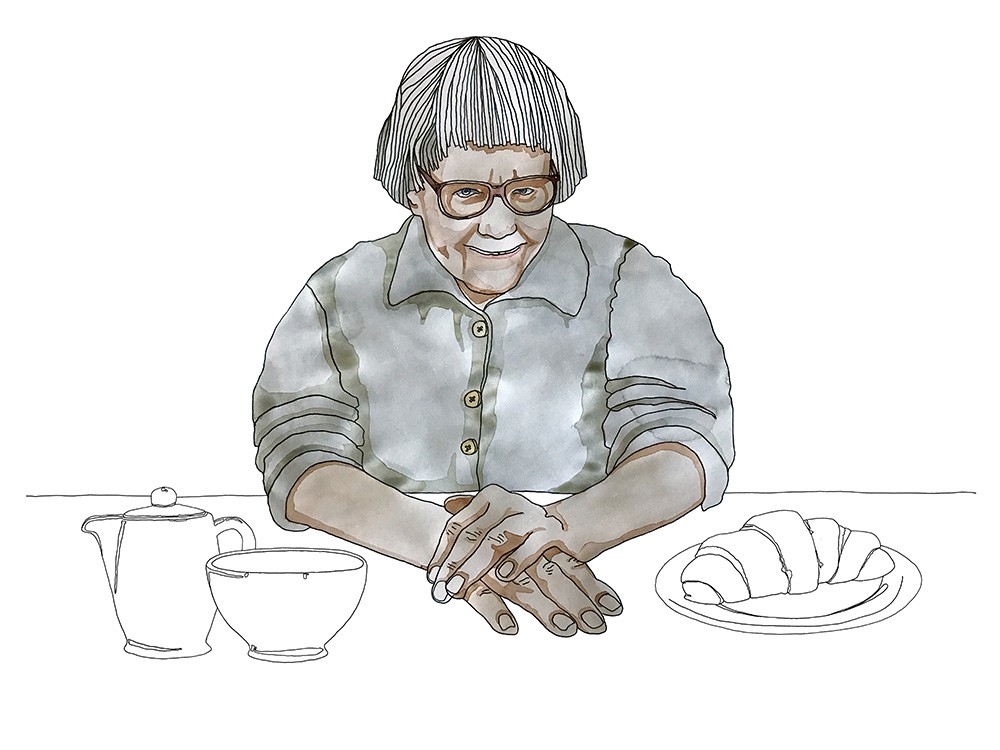Goldfrapp, "Ocean"
Let’s do it.

Oh my God can we call it a week already? PLEASE? How about this: I will share some new Goldfrapp with you and we will agree to part from each other’s company until Monday’s cruel embrace clutches us both close to its chest once more. OKAY? Okay, great. Enjoy. Silver Eye is out March 31.
Dog
The Adventures of Liana Finck

Liana Finck’s work appears in The New Yorker and Catapult, and on her Instagram feed. Her first book, A Bintel Brief, was published by Ecco Press in 2014.
Le Pain Quotidien, UN Plaza

Illustration: Forsyth Harmon
We were operating at very different speeds, you and I. The moment I saw you I felt abashed. I was hovering at the bathroom door, infuriated by its red ‘occupied’ lock, anxious and agitated before a meeting two blocks away that began in three minutes, trying not to cede to the full-bladdered indignity of actually hopping from one foot to the next, and wondering whether to knock, or how long to wait before I knocked, and how loud and peremptory to make that knock if I found the balls — the bladder? — to do it. I was here buying my way to a bathroom with an essentially unwanted cup of tea; in two and a half minutes I would be turbo-sprinting out of here, flinging this half-drunk cup into a trash bin on a corner as I went, coat flapping, ego-engined up on living one’s high-speed drama for a couple of city blocks.
You, though, were a small and still old lady bent over a table on her own. I felt there was a sanctity to this, a daily ritual. That a cup of coffee at the corner table of Le Pain Quotidien was, well, your quotidian pleasure. In short, I was here to pee, you were here to be. Your place was my convenience.
Your shapeless blue jeans were surprising. But of course you’d been young once too. Why should you wear tweed now that you were old? I could imagine you in these plain blue jeans as a thirtysomething in, say, 1965. Maybe you’d had a SoHo loft and made massive Abstract Impressionist paintings and watched your male peers ascend a ladder of back slaps and solo shows while you were dismissed and jeered at, called a crazy lesbian for your workmanlike clothes and grand aspirations. This was fanciful, I know. A full bladder has always made my imagination skitter. But whatever you’d been, you must have seen so much, because this was New York City and you were at least eighty years old. And I suspect only unconventional women wear denim at eighty.
You had white hair, bobbed short, with even shorter bangs and the effect was child-like. It was your hair that made me think of Harper Lee, specifically, the sweetly quizzical, innocent Harper Lee whose face accompanied news stories about Go Set A Watchman. I’d found that face terribly painful: it seemed to not know what had been done to it, the whole exploitative travesty of that book. But then, later, Google imaging, I couldn’t find this expression anywhere. Instead, this grid of tiles of her face on my phone screen presented someone spry and a little wicked. That firm chin, that cackle of smile revealing an upper row of tiny, cat-like teeth. I blamed an iPhone’s wonky Google image search. I had to concede, though, the more likely explanation — that back then I’d reconfigured Lee’s face each time I saw it — a sort of auto-emotive Photoshop of my own eye and brain. In other words, I’d projected on her, just as I was now projecting onto you. Swaddling you in sentiment because I was scared not just of being eightysomething, but scared, too, of now — of being thirty-two.
Just before the bathroom door finally opened I watched you prepare to get up. Your hands gripped the sides of the chair and I saw you lever yourself, the one, two, three! of propulsion — the same motions my grandmother made for the last decade of her life, maybe the same motions that every old person makes, the same motions that I’ll make, in forty or or fifty years’ time, when getting out of a chair has become a serious business. It was a practical thing, this one, two, three, but in its valiance it seemed spiritual too — like a woman crossing herself, or prayering her hands, or raising a fist in a protest, or just setting her shoulders back and inhaling — all the things women do to tell their bodies to stay strong.
A few days later, I read about the genesis of the term “empathy” — and how shocking that it was only a hundred years old. (The word of course, not the instinct) The writer and philosopher Friedrich Vischer wrote, “I seem merely to adapt and attach myself to the object as one hand clasps another, and yet I am mysteriously transplanted and magically transformed into this Other.” Vischer was talking about lifeless things, not you, but he called it Einfuhlung, or, “feeling in.” I felt you, is what I’m saying. Just for a minute or less, before I pissed and ran.
> Memory bombs
From Everything Changes, the Awl’s newsletter. Subscribe here.
I was in D.C. for work this week — it’s the city where I spent most of my twenties, had many jobs, met many people I love — and it felt like there was a memory bomb on every other corner.
I made a right turn and there was the street where I turned a song in my headphones up to quell my anxiety as I neared a Metro stop where a crush was waiting for me. There was the nondescript office building that’ll always be where I had the first job that felt like the beginning of a career. That’s where I met Theresa, Erin, Mary, James for the very first time.
I asked readers of Everything Changes to tell me about their own memory bombs—the places that bring to mind a specific moment in their lives—and put them into a map.
Click on each location for a story:

A few of the stories you’ll find in the map:
Kottbosser Brücke, Berlin, Germany: There is a bridge where I stood with my then boyfriend the moment I broke up with him. He said he’d jump, and for a little while we stood there, wrestling. Him trying to get to the edge, me holding him back. I was stronger than him. — N.
The bridge from Tennessee to Arkansas: I drove home after college, which was extremely tumultuous for me, and the feeling of “I could have gotten in a car and just LEFT this WHOLE TIME?” was very freeing but also helped me recognize my own power and agency in life. Crossing the state line really was that moment of “I don’t live here anymore. I am not in college anymore.” It poured my entire drive through Arkansas and I never stopped, but any time the state comes up I am taken back to that feeling of accomplishment that I survived but also that I don’t need to make life hard on myself, I can make change. — SMS
An Afghani restaurant in Midtown: Where my office friend/crush and I once got lunch. The waiter asked if we were dating, while he poured waters. No, we said. That’s ok, he said, Today you pretend you are dating. — Anon.
More stories on the map. Thanks so much to everyone who sent one in. ❤
From Everything Changes, the Awl’s newsletter. Subscribe here.
Daigo Hanada, "Fragment II"
Let the snow bury us under.

Sometimes the snow comes down in March. Actually, most times the snow comes down in March. It’s still technically winter, you know, and just because February was so warm that you could walk all over town with no coat it doesn’t mean that nature won’t revert to type every now and again. Of course next week when it’s 99 and hailing we’ll be singing a different tune, but what are you going to do, everything’s fucked and there’s no point in trying to figure it out anymore. Enjoy the non-nuclear kind of winter while you still can.
Hey, this is awfully pretty. As we live in a time when very little else is pretty, I hope it and the falling snow will provide you with a brief moment of joy today. I know how badly you need it.
Seven Weeks Later
A reflection in verse

You probably don’t remember now, but when the week began
we all were pretty panicked by the manner of a man
who, briefly left unsupervised — so, angry and alone —
sent out a stream of unsupported bullshit from his phone
With any other leader and in any other time
we wouldn’t shift the focus from the coarseness of the crime
We couldn’t cease from warning of the danger to our land
We’d never stop demanding that this sick regime disband
But this guy throws out so much to discredit and abhor —
And now another weekend looms: Get ready for some more
New York City, March 8, 2017

★★★ Wisps of down clung to the morning knock-around hoodie where the puffy vest, for now unneeded, had hung with it for months. The night’s lashing rain had passed just in time for the walk to school. In another two hours the clouds were broken apart and furiously aglow; another half hour and the sky was entirely clear. Now and then a tiny scrap of cloud would show up.
Would You Eat A Pie Sandwich?
I promise nowhere in here does it say “h*t d*g”

Two things are for certain in this world: England has weird food traditions, and the internet has strong opinions about sandwiches. Put ’em together and what have you got? A lot of indignant UK-based tweets about pie flavors. Today, a colleague of mine who just looooooooves to keep up with the goings on about Knifecrime Island shared this article about putting a meat pie (very English) between two slices of bread (and not just bread, but bread leavened with the gross yeasty scum at the top of fermented beverages like beer or liquor—VERY ENGLISH):
I blinked and looked at the meat-and-potato pie sandwiched between a buttered white roll. It was just a pie barm. I looked behind me to see if there was someone eating something exotic and outrageous. But no. It was me. Me and my pie barm.
What is a pie barm? In Wigan, it’s a way of life | David Barnett
The cultural history of meat pies aside, he was shocked at the idea that someone would put a carb between two carbs (tune into my new podcast, “Between Two Carbs,” launch date TBD). Yes, we told him about the “toast sandwich phenomenon.” And obviously the chip butty (French fries on a roll with ketchup and mustard, also British). We’ve been putting carbs on carbs and in carbs for quite some time. And you know what, sometimes it’s delicious, if indulgent and starchy! Potatoes on pizza? Classic Roman treat. Potato tacos? Big in Mexico, usually with the potatoes fried, and spun more recently into a food-truck delicacy by Wesley Avila of Guerrilla Tacos in L.A. Potato pierogi? Happy Lent! Fried dough on a sesame bun? Good morning, Taiwan!
Let us not forget the Spanish empanada or the Jamaican Meat Patty, both of which are sort of like cousins of the “Cornish pasty” or the “meat pie” or “pie,” depending on your ex-colony of choice. Back in 2013, Robert Sietsema called it one of Brooklyn’s best snacks in the The Village Voice. He continued, “Here’s how to make it into a meal”:
Step #1: Buy a meat patty. We prefer the spicy beef from Jamaican Pride Bakery.
Step #2: Buy a coco bread to go with it — a soft, vulvar yeast bread sweetened with coconut milk..
Step #3: Put the patty in the coco bread, The patty fits inside the coco bread like a hand inside a glove, constituting one of the world’s greatest culinary embraces.
How to Eat a Jamaican Meat Patty
VULVAR!! ROBERT!!!!!!!! While I appreciate the anatomical ingenuity of any good word choice, I object to it being paired so closely with the words “hand inside a glove.” But my point is this: you make do with what you’ve got, and then many hundreds of years later when your descendants have invented lots of different ways of putting foods together in delicious and possibly disgusting ways, you get interesting combinations. Hence the famous New Jersey “Italian cheeseburger” or a “Pittsburgh salad”—essentially the same items just enhanced with French fries. Or the thing where you put potato chips INSIDE your sandwich (quite good). Surely someone has thrown a calzone between two pieces of bread to save their fingers from getting greasy. In this case the bread is just an edible napkin! A vehicle for eating the contents, like a taco bowl or a bread bowl, two other horridly ingenious American foodventions. In America you can put your carbs anywhere you like. When Eater co-founder Ben Leventhal went looking for the origins of pasta on pizza, here is what he found:
Agatha Mangano of the Mangano family of Famous Original Ray’s insists that they’ve been serving the pizza since the mid-1980s, when customers started requesting it. And, so, alas, it wasn’t me. But I can take comfort in knowing it wasn’t a marketing gimmick. It was a carb-crazed customer like me. Instead of ’90s frivolity, it was ’80s excess. So now we know. Ray’s. Sometimes, the Yankees win.
Not only can you pub your carbs where you want, you can also use lettuce instead of a bun, or another patty instead of a bun, or if you’re really looking to sell some advertising, bacon and cheese between two pieces of fried chicken. I would argue that the pie sandwich is even more of a sandwich than the “Protein-Style” In-N-Out Burger or the KFC Double Down, since people seem so tied to the carb as the wrapper or envelope of the sandwich. It’s like a Turducken but a sandwich. A recursive sandwich. A sandandwich.
We should be open to sandwich invention. Also, now that most meat is carcinogenic, going extinct, or morally objectionable, y0u’re gonna need to start looking for other things to fill your sandwich with. Crickets, maybe. More sandwiches should be like peanut butter and jelly, which is more of a minimalist sandwich and hence much easier to eat without all that lettuce and tomato and avocado just sliding out when you squeeze down.
In conclusion: I love crusts, so yes, I would eat a pie sandwich.
Brahms Bangs

This past weekend, I was lucky enough to go see a classical music performance live. You might be thinking, reading this column and knowing I live in Chicago, that I see the Chicago Symphony Orchestra in concert all the dang time and thus that’s an uninteresting way to start this column. You could not, however, be more wrong: it was my first time back at the Symphony Center since 2009! It’s expensive, and I tend to more quickly spend money on things like food and new shirts, especially when I have Spotify. (Spotify… please sponsor me… thank you.)
On the program this past weekend was a performance of Brahms’ Piano Concerto №1 and Shostakovich’s Symphony №5 by the St. Petersburg Symphony Orchestra. I’ve written at length before about this particular Shostakovich symphony, so I’ll spare you most of my fawning. That said, this was the first time I had seen Symphony №5 performed versus performing in it, and woof, it was really something. It’s sweeping and funny and majestic and tragic, and to see it live is really such a rejuvenating and profound experience. I know I already blew my load (sorry) saying that Symphony From The New World is the best symphony of all time (nearly six months and I’m sticking to this bold and potentially incorrect take), but allow me to also add: Shostakovich’s Symphony №5 is the best piece of music in the entire 20th century. Sorry to, uh, The Beatles.
I’ve yet to write, however, about Brahms’ music yet, although I am still reading my giant fucking Brahms book. I promise with my whole heart that this isn’t about to become a piano concerto column, but this particular Brahms piano concerto was one of the pieces I set out to write about before I even got my giant fucking Brahms book. This was a piece that had been stuck in my head for years — among a handful of other Brahms’ pieces — and I felt like I needed to know more about Brahms the person before I could ever begin to wrap my head around what the hell is going on in this concerto.

As I mentioned last week, Brahms spent a significant portion of his early 20s staying with the Schumanns in Düsseldorf. There, he wrote and toured and performed around Germany with them in tow as well as his violinist friend, Joseph Joachim. It was during this wayward, romantic period of this time, the 1850s, to be precise, that he composed this first concerto of his. This is really the first major Brahms piece. Brahms loved to destroy his compositions for a while. Much of what existed from his teens — folk songs, little sonatas, what have you — are gone. Today, he would be one of those people who has a plug-in delete all of his tweets after a week. Which is fine! I mean, I don’t care, it’s your account, it’s your legacy as a composer, etc. The deal with Brahms, generally, is that no one really knew what the deal with Brahms was. He wasn’t isolated and obsessive with his craft, nor was he a big social butterfly. He seemed intense and focused, introverted with a lot bubbling beneath the surface in that classic German way, and also, for what it’s worth, pretty hot. Amidst all that, we’re left with a statement of a first big piece.
I actually only want to focus on the first movement of this concerto because there’s enough there to really dig into. Brahms’ Piano Concerto №1 in D minor (New Philharmonic Orchestra from 1998 with Daniel Barenboim as the soloist) starts with a big, deep fanfare — timpani, low brass, you get the drill — before the strings come piling in. It’s not an easy beginning. It’s not an easy piece, period! It’s 23 minutes long! It’s harsh and complicated, almost pushing you away from the music inside of it. Brahms wants you to work for it, which, once again, given what he looked like at the time, sure.
The piano doesn’t even enter until nearly four minutes into the piece, and while its opening refrain is soft and seductive, it quickly escalates once again. It’s a piece of contradictions: equal parts delicate and flowing as well as loud and almost, I don’t know, banging. Not like “this bangs,” but like, “wow, he really is banging on the piano.”
There is a little part in this first movement in particular that I think is one of my favorite piano melodies of all time. Some context within the movement: start at the 13:25 mark and listen to this crescendo between both the piano and the orchestra. It’s disorienting and almost jumbled. Your brain is going to recognize that it’s building to something… significant, of course, but it’s not clear yet. There are two big staccato chords at the 13:41 and 13:42 second marks. And then there it is. This cascading, light melody descending down the keyboard that then jumps back up. And it only really lasts about 20 seconds before the piece moves on melodically. It’s almost comedic. Truly, as I listened to this part live this past weekend, I nearly burst out laughing. It’s so unexpectedly beautiful. The wonderful thing about being able to hear it on a streaming service is you can play that little section over and over again, which, honestly, you really should do. It’s just delightful.
Like I said: that conflict-free section is short-lived because Brahms manages to work his way back up to a restatement of the opening theme, this time on the piano. It’s as if the soloist has overtaken the orchestra, reframing the music on its own terms. Not unlike the Beethoven piano concerto, there’s a real representation of the piano as a deeply powerful instrument in this concerto in particular. The piano is to reckoned with. Maybe it’s a protagonist in the face of adversity. Maybe I’m projecting. Who’s to say? After almost ten years of knowing this piece — and this movement in particular — I don’t feel any closer to it than when I started. The more I learn about Brahms, the more unsettling it becomes. It’s a Rubik’s cube of a piece. And yet, that final minute always gets me. Every time. The pianist: both hands, jumping up and down the keyboard, striking down hard on the downbeats of the melody. It feels chaotic — that humorous part from earlier in the piece coming back, this time in a minor key, like the evil version of itself, all building to a swift, clean climax. In the event that you feel any resolution whatsoever at the end of the movement, don’t get too comfortable. It’s only just begun.
Fran Hoepfner is a writer from Chicago. You can find a corresponding playlist for all of the pieces discussed in this column here.
The German Obsession With Spelling
Deutschland über us.

Of the myriad existential quandaries facing contemporary humanity, here’s one I didn’t expect: Do firefighters have to know how to spell? Just kidding, that’s a German question that Germans asked, so it could not be more expected, because the people who invented a language where you can legit create your own 80-letter compound noun to describe the bureaucracy specifically designed for governing the captains of steamships on the Danube shall not be trifled with. Hence, this thousand-word think piece in the Süddeutsche Zeitung fretting over the fact that some 60 percent of recent applicants to the fire brigade in the northern Spain town of Burgos flunked the entrance exam because they couldn’t spell anything.

But it’s not just about the damn Spanish, insists the Süddeutsche. In fact, “there’s a great lamentation here in Germany about the writerly deficits of our younger generation.” Woe, laments the great lament: at present the Bundeskriminalamt (BUND-us-krimm-ee-NALL-ahmt) — the Federal Criminal Police Office, essentially the German FBI — currently has 820 vacancies. The reason for this? Not enough applicants can pass the spelling test, which may or may not contain the word Rechtsschutzversicherungsgesellschaften (WRECKT-shoots-fur-ZIK-ur-ungs-guh-ZELL-shoft-un), a stultifying word for insurance companies that provide legal protection (and, admittedly, a thing that German FBI agents should probably know about, I guess).
The word that starts that monster compound, Recht, is itself deceptively complex given its single syllable. (In fact, I’ve even exegesis-ized about it before. That’s right, I can make up sick compound words, too. Suck it, Heidegger!) Anyway, Recht, capitalized as a noun, means, among other things, law, justice, right and privilege. As a small-letter adjective, it can mean both right and quite (a.k.a. “right” with an English accent).
One of my favorite lines from the magnificent novel Jakob von Gunten by the Swiss author Robert Walser is about a recht vernichtender Schlag (WRECKT fur-NIKT-und-ur SHLOGG), which technically means a “quite nullifying blow” that the title character — whose only goal in life is to become an “adorable round zero” — longs for. But that phrase also carries in it the connotation Recht vernichtender Schlag, a “law-annihilating blow,” something that doesn’t just nullify a person, but also obliterates his right to exist, by obliterating the social order that makes that right possible.

Anyway, Jakob von Gunten, which happens to be my favorite book that was not written by Franz Kafka (and was, coincidentally, a favorite book of Franz Kafka’s) is a magnificent little novel about a school for butlers where no teachers ever materialize, and no lessons are ever taught. So, presumably, the students never learn spelling, the word for which, of course, is Rechtschreibung, which is the entire point of this excellent trip down the desultory memory lane of graduate school (which, coincidentally, sometimes felt like a school for butlers at which no teachers ever materialized and no lessons were taught).
Rechtschreibung. (WRECKT-shribe-ung.) Literally, right-writing. Connotatively: writing justly; lawfully correct writing. So, no wonder the Teutonic get so cranky when you wrong-schreiben. When you misspell to a German, you don’t just overlook the language: you libel it; you defile it; you annihilate it—with, so to speak, a Rechtschreibung vernichtendem Schlag.
Or, at any rate, I do, indiscriminately and constantly.
I shouldn’t be a such terrible speller, in German or any other language, and yet I am. I’m 40 human Earth years old, and that means I grew up doing homework longhand and typed up my German papers in college without the aid of a multilingual spellcheck. Unlike 60 percent of the applicants to the Burgos firefighters’ brigade and (presumably) 100 percent of the applicants to the German Bundeskriminalamt, I somehow managed to pass all my tests and amass a high school diploma, so ostensibly I once knew how to spell in at least one language. But now, as a grown-up, I’m fluent in two languages, somewhat conversant in three more, and proficient at spelling in exactly none/keine/ninguno/nikdo/никто.
Combine that with my standard typing speed of 90 streams-of-consciousness per minute, and the uncanny habit of my Nietzschean abyss of a toddler to require my attention at exactly the moment I’ve got a deadline — and combine that with the German duty to properly castigate the debasers of the Muttersprache (MOO-tur-SPROK-uh) — and you get amazing exchanges like the texts between me and one of my German friends upon the august publication of last week’s groundbreaking investigation of the Society for the Promotion of the Reputation of Blood and Liver Sausages.

In fact, I think there are still typos in that piece, thanks to what my friend helpfully terms my Verschlimmbessern (fur-SHLIMM-BESS-urn), yet another untranslatable compound that more or less means “to make things worse by trying to make them better,” but with a super-mean and dismissive look through teeny-tiny spectacles somehow implied in the word itself.

Anyway, that many typos is ignominious, even for me, and so I did what all people who nominally know German do, and I blamed the Fehlerteufel (FAY-lur-TOY-ful), literally “Devil of Mistakes,” who is, I shit you not, a special mythical demon Germans invented who climbs into your computer and inserts typos for fun and sport, and possibly profit. (A lot gets lost in translation, so I’m not sure about his motivation.)
I’m also not sure any Germans buy my excuse, however, because as far as they can see, that particular devil is perpetually busy living inside the Twitter of the Commander-in-Chief. For example, take this recent article in Die Welt (The World, an uptight conservative publication), which someone has cleverly headlined “The Fehlerteufel in the White House.”

This headline ostensibly refers to the imp who (obviously) lives inside Trump’s Android device, but it’s also not-subtly calling Trump himself a Mistake Devil — an epithet that conjures up the not-unjustified tableau of the tufty orange chief executive clambering into the mechanism of democracy in the wee hours of the morning when Jared and Ivanka are asleep, shrieking with giggles as he razes it to the ground with a recht (and Recht) vernichtender Schlag.
Yes, clearly, German Chancellor (and, I can only assume, excellent starer-into-souls) Angela Merkel is going to have a lot to talk about (and possibly spell out, carefully) with President Trump on her alleged visit to the White House less than a week from today. Given the constant onslaught of news from that particular edifice that defies belief, however it manages to be spelled, I cannot even allow myself to imagine the potential ways in which either Trump or Merkel will leave that meeting grievously insulted — and thus, the ways in which that meeting might imperil the precarious order of whatever today passes for Recht.
But whatever happens, Merkel’s visit will give me a lot to think about when I mock how seriously the Germans take their damn spelling. I like to lump their obsession with Rechtschreibung in with their other silly obsessions with doing things “right,” because, like any good American, I like to situate my moral philosophy in a way that excuses my own weaknesses. Still, even five months ago, I would have looked at the latest set of revisions to the Duden (the massive multi-volume dictionary that dictates how to punctuate and spell in German) with my usual knowing snort. But maybe the Germans have always been onto something. Maybe, when the Mistake Devil disrespects the Rechtschreibung, he’s not just defiling the concept of “writing right.” Maybe, just maybe, he’s annihilating the concept of right altogether.
